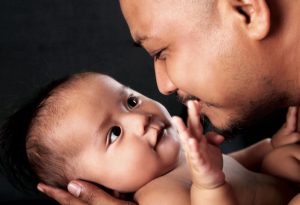In this Article
Your bundle of joy is finally in your arms – you’re probably wondering whether or not your little one recognises you! Well, the fact of the matter is that babies are naturally drawn towards faces, and they prefer to observe human faces over other things. In the following article, we shall discuss when babies recognise their mother, father, and other familiar people.
Babies Recognise Their Mom First
A newborn baby feels more comfortable around the mother because not only is the mother’s scent and voice familiar, but the baby also sees more of her all through the day. In most cases, a baby gets to be with the mother a lot more than other members of the family, which is why babies recognise their mothers first. By the time a baby turns three months old and can distinguish between various faces, she may become wary of strangers and unknown faces. So, the question remains – do babies know their mother at birth? Well, that is still debatable, but a mother is certainly amongst the first few people that a newborn baby gets familiarised with.
When Do Babies Start to Recognise Their Fathers?
There are no studies that analyse when babies start to recognise their fathers. However, it is believed that babies do respond and recognise their father’s voice from the womb. For this very reason, many doctors highly recommended that the would-be-dads talk to their babies when in the womb. Babies are born with blurry vision, and by the time they are a few weeks old (in most cases by the time babies turn two) they are most likely to recognise both their parents’ faces.

Determining When a Baby Begins to Identify People
While there is no concrete evidence that helps parents understand when their baby can begin identifying people, some research signifies that a baby can recognise a mother’s face early in life as compared to other people and things, which usually takes longer. A baby can recognise her parents’ faces fairly early, but it takes a couple of months or a year to get familiar with other family members and close friends. The baby may familiarise herself with family members she sees regularly quicker as compared to distant relatives who do not visit often.
What About Looks When It Comes to Recognizing People?
Just the way adults find good-looking people more attractive, babies also find beautiful people more appealing. You may find your baby staring or looking longer at faces that she may find more attractive than others. This is because babies are also fascinated by certain kinds of faces.
In a study conducted in 2017, researchers found that babies are capable of having preferences of faces they like to see even before they are born – these preferences are present right from the womb! In the study, 39 fetuses at 34 weeks gestation were observed – 2 visual stimuli representing face shapes were projected on the mother’s womb, out of which one was inverted. The movement of the head of the foetus was observed using high-quality 4-D sound. It was observed that the foetus moved its head to track the projection of the face shape, but did not do so for the inverted one. This proved that the foetus did not move its head to recognise a pattern, but to the shape it found appealing!
Effects of Unfamiliar Faces
You may experience that your baby is happy and playful in your or your family’s company, but behaves erratically in front of strangers. This is because your baby feels comfortable and cosy with familiar faces and is wary of unfamiliar faces. Unfamiliar faces or strangers may make your baby inquisitive and apprehensive, making her behave strangely. This does not necessarily mean she is anxious or scared, but unfamiliar faces may make your baby uncomfortable.
Things to Remember
Babies are born with the innate quality of bonding with people. Though there is no scientific evidence to prove that, it is certain that babies recognise people much quicker than they recognise places – this happens because their vision is still developing. By 3-4 months of age, a baby recognises the parents, and the vision keeps improving with each passing month. If you notice that your baby is not recognising people and places by 4 months of age, you may want to mention it to your paediatrician. It is better to bring any susceptible vision problems to your doctor’s notice at the earliest, for timely medical intervention.
If you are first-time parents, you may desperately want to know when your baby will be able to recognise you. The best thing that you can do as a parent is to have patience – by the time she is a few months old, you will see your bundle of joy smiling at you!









